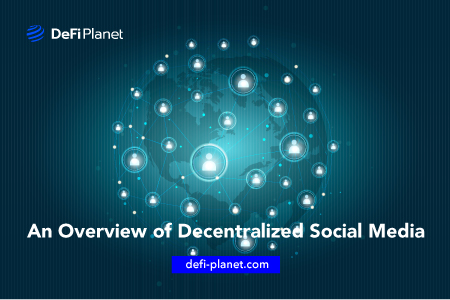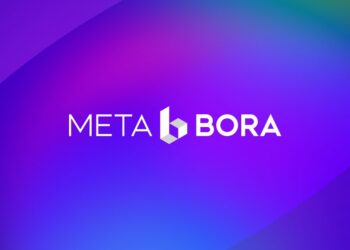With the advent of blockchain technology, there have been notable advancements in a multitude of sectors, ranging from finance to social media. Decentralization is a critical component of blockchain-based technologies. This eliminates the need for a centralized authority to make decisions about what happens in the ecosystem.
Although the concept of decentralized social networks is not new, the demand for them appears to be increasing. This article examines the concept of decentralized social networks, their benefits and challenges, and how they could improve the way we interact with each other.
What are Decentralized Social Networks?
Social media existed long before the concept of decentralization was conceived. It evolved from people communicating with one another on websites that only permitted chat features to ones where people could upload videos, play games with others, use filters, create content, and make a living off of it. Social media has evolved to the extent that some people, known as “influencers,” make a living by creating content.
As the demand for Web3 innovations increases, decentralized social networks have become the talk of the town.
A decentralized social network is not governed by a centralized authority that ultimately makes decisions, changes policies on a whim, generates revenue from the sale of user data, and advertises to users while offering little or nothing in terms of rewards or revenue stream to their user base.
Centralized social networks reserve the right to ban any account or block specific individuals from utilizing their services. Users have more control and autonomy in a decentralized social network as they can customize the services to their preferences.
Features of a Decentralized Social Network?
Decentralized social networks are the polar opposite of their more prevalent centralized counterparts.
Some characteristics of a decentralized social media platform are listed below.
• User control
Users retain complete control over this type of social media platform. There is no centralized authority that defines what type of advertisement the user should view, what kind of information appears on their timelines, whether they can use a word or not, and other similar elements. In decentralized social media, independence is a fundamental characteristic. When a significant change is required, a voting session is held, which is uncommon on traditional platforms. For example, if Facebook has to make adjustments, it can do so on the spur of the moment without regard for user feedback. A classic example is the changes made to their privacy policy.
TechCrunch describes it as, “To that end, they’ve taken the “privacy settings” settings and scattered them mischievously among the other categories.”
In typical decentralized social media platforms, voting is done before changes are made. The social media platforms possess utility or native tokens that can be used in the voting session to validate a vote.
• User privacy
Cases of traditional social media platforms profiting off user data are widely prevalent. Though there are standards governing social media users’ privacy, such as the General Data Protection Regulation (GDPR) in Europe, many social media platforms have discovered ways to bypass them.
The information gathered is used by companies that want to run advertisements or target their potential customers. Most of the time, the money earned through adverts and other means of data exploitation does not wind up in the hands of the users. In circumstances where this occurs, such as on YouTube, the amount paid out to users is insignificant in comparison to the profit made by the company.
Aside from the aforementioned, data collected from users can be used directly or indirectly by social media platforms to manipulate critical social activities. One example is the alleged role of Facebook in the Cambridge Analytica scandal.
According to the New York Times,
“The Times reported that in 2014, contractors and employees of Cambridge Analytica, eager to sell psychological profiles of American voters to political campaigns, acquired the private Facebook data of tens of millions of users — the largest known leak in Facebook history.”
The article in the New York Times went on to state, “lawmakers demanded that Mark Zuckerberg, Facebook’s chief executive, testify before Congress.”
It added, “The Times originally reported that Cambridge harvested data from over 50 million Facebook users. But at the bottom of a company announcement about new privacy features, Facebook’s chief technology officer, Mike Schroepfer, issued a new estimate for the number of users who were affected: as many as 87 million, most of them in the United States. “
This is just one of the many ways that traditional social media platforms compromise users’ privacy.
• Censorship
Censorship is a common phenomenon on traditional social networks. Certain terms may result in account suspension for some time, and persistent use may result in an outright ban. The use of the aforementioned terms may appear harmless at times, but this does not mitigate the risk of being banned.
Because there is no centralized authority to decide what should be allowed or prohibited, decentralized social networks do not support censorship.
• Trust
Traditional social media sites do not have a high level of trust. Because of their lack of transparency, people do not trust them.
On the other hand, the implementation of blockchain technology in decentralized social networks has included this quality. Everyone can see what is happening at all times, and the data is immutable, which means users cannot alter it.
• Reward system
Most traditional social media platforms generate revenue through advertising based on user data. Only a few of them have a reward system in which they pay back a minute portion of their earnings to their user base.
In most situations, they do not provide monetary rewards to their users. Many decentralized social media networks, such as Steemit, possess underlying tokens used to reward users who utilize their services or engage in other activities on the platform.
These tokens may be utilized in governance activities or traded on exchanges.
On Steemit, users earn the native token, STEEM, for publishing and curating content.
Examples Of Decentralized Social Media Platforms?
Several decentralized social media platforms exist. Some of them are focused on publishing articles, stories, and other forms of written content while others specialize in videos and audio content.
Common examples of decentralized social media platforms are Steemit, Dlive, LBRY, Torum, Subsocial, and Minds.com.
Incidents That Have Led To An Increased Call For Decentralized Social Networks
In 2021, the former President of the United States, Donald Trump, was banned from using major social media platforms like Twitter, Facebook, Snapchat, Instagram, and YouTube. This came after the attack on the Capitol and Trump’s alleged use of social media to breed violence. An action like the aforementioned led to a great debate, as some people felt that their right to freedom of expression was curbed by the actions of the big tech companies that controlled the social media space.
According to reports, “Facebook and Instagram announced a permanent ban (although, in June 2021, they said they would revisit the ban in January 2023). Twitter permanently suspended his @realDonaldTrump handle, followed by the official account of his campaign (@TeamTrump) and the accounts of allies who posted on his behalf, like Trump campaign digital director Gary Coby. Twitter also deleted three tweets by Trump on the @POTUS handle and barred access to the presidential account until Joe Biden’s inauguration.”
Another reason why the concept of decentralized social media has recently been debated is Elon Musk, the CEO of Tesla and SpaceX.
For a long time, Musk has talked about building a decentralized social media platform that would allow free expression and reduce the likelihood of individuals being afraid to express their thoughts.
He originally hinted at the possibility of building such a platform, which led to him conducting a vote regarding the need for Twitter to be more open in permitting free speech.
A few days later, it was disclosed that he had purchased more than 9% of Twitter’s shares, and a few days after that, he declared that he was offering to buy 100% of Twitter’s shares.
His motivation for wanting to acquire Twitter can be traced back to a March 2022 tweet: “Given that Twitter serves as the de facto public town square, failing to adhere to free speech principles fundamentally undermines democracy.” What should be done? “
In Conclusion,
- Decentralized social media platforms are resolving issues that have been identified with their traditional counterparts.
- There have been reports of traditional social media networks violating their users’ privacy.
- User control is a typical feature of decentralized social media platforms.
- Some decentralized social media platforms offer users rewards programs that are driven by their native tokens.
- Elon Musk and others are leading the charge for greater decentralization on traditional social media platforms. Evidently,
- Some individuals or groups have taken steps to make this a reality, as there are numerous decentralized social networks in existence today.
If you would like to read more news articles like this, visit DeFi Planet and follow us on Twitter, LinkedIn, Facebook, and Instagram.





















